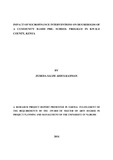Impact of microfinance interventions on households of a community based pre- school program in Kwale county, Kenya
| dc.contributor.author | Zubeda, Salim A | |
| dc.date.accessioned | 2014-09-10T08:42:43Z | |
| dc.date.available | 2014-09-10T08:42:43Z | |
| dc.date.issued | 2014 | |
| dc.identifier.uri | http://hdl.handle.net/11295/74276 | |
| dc.description.abstract | Various studies have concluded both positive and negative impacts with many results being highly contested on grounds of methodology. While other studies have concluded improvements in women empowerment and increased status in the household others have concluded vicious cycles of debt. The objective of this research study was to show evidence of financial and social impact of microfinance at household in a community preschool project in Kwale County. The study was based on quantitative tools adapted from AIMS/SEEP network. Random, purposive and stratified sampling was used to identify both impact survey and exited clients in the study area. A total of 120 respondents participated in the survey. Data was collected through face to face interviews. Data analysis used descriptive and inferential statistics on SPSS program. From the analysis this study found positive impact on both social and financial indicators on clients’ household .The study findings revealed positive correlations of microfinance and households variables. Clients were able to increase their incomes, savings and assets and also able to educate their children to higher academic levels. Longer term clients seemed to benefit a little more than the short term clients. A regression analysis conducted revealed unreliable for the prediction of household impact. Challenges experienced included loan program inflexibilities that forces client to manipulate the program to meet their needs. The study asserts therefore the need for microfinance institutions flexibility in products especially ability for the clients to access their savings instead of just relying on loans when one is in need of cash in between loans since the only way one could get their savings is after withdrawal of membership. The study also recommends strengthened capacity building for clients to improve MFI impact | en_US |
| dc.language.iso | en | en_US |
| dc.title | Impact of microfinance interventions on households of a community based pre- school program in Kwale county, Kenya | en_US |
| dc.type | Thesis | en_US |
| dc.type.material | en_US | en_US |
Files in this item
This item appears in the following Collection(s)
-
Faculty of Education (FEd) [5979]

